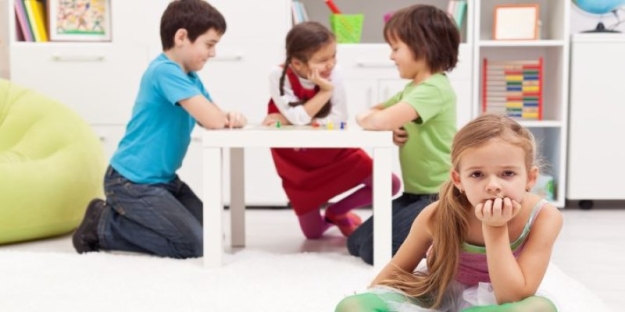General Finance
Best High-Yield Savings Accounts to Grow Your Money
1757645995000
Have you ever worried about whether your child feels left out at school or in the neighborhood? Making friends isn’t always easy for kids, but strong friendships play a big role in their happiness and confidence.
Have you ever worried about whether your child feels left out at school or in the neighborhood? Making friends isn’t always easy for kids, but strong friendships play a big role in their happiness and confidence.
The good news is that parents can step in with simple, practical ways to help. Here’s a closer look at what works when children are trying to build connections.
Children thrive when they have friends to share experiences with. Friendships give them someone to laugh with, a partner for games, and emotional support when they feel nervous or upset. Studies even show that kids with close friends tend to do better academically and develop stronger social skills later in life.
But while some kids naturally click with others, many struggle to know what to say or how to join in. That’s where parents can guide them gently without taking over.
Confidence is at the heart of making friends. If a child feels unsure of themselves, starting a conversation can feel overwhelming. Parents can help by creating opportunities where the social setting feels less intimidating.

For example, instead of dropping your child off at a large birthday party where they don’t know anyone, arrange a one-on-one playdate with another child from school. In a smaller setting, kids are more relaxed and willing to share toys or chat.
Role-playing at home is another useful tool. You might pretend to be a new classmate and let your child practice simple phrases like “Do you want to play?” or “Can I join?” Over time, this helps them approach real-life situations with less fear.
Think about your friendships—aren’t many built around common hobbies or passions? It’s the same for kids. A child who loves drawing is more likely to connect with others in an art class. A child fascinated by soccer may find their circle on the field.
Parents can encourage this by signing children up for clubs, lessons, or sports teams where their interests are shared. These settings naturally spark conversation. Instead of forcing kids to “find friends,” they’ll discover bonds through activities they already enjoy.
For instance, a shy child who joins a Lego club might start talking with others about what they’re building. That natural interaction often leads to lasting friendships.
Friendship is a two-way street, and kids sometimes need reminders about what makes others feel included. Simple lessons in kindness—sharing, listening, and giving compliments—go a long way.
One helpful approach is pointing out examples in everyday life. If your child notices someone sitting alone at lunch, ask how they think that student feels. Encourage them to imagine ways they could reach out, like offering a seat or starting a small conversation.
Children who understand empathy are more likely to form deep connections rather than surface-level friendships.
Not every attempt at friendship works out, and that can be painful. Parents often want to shield their kids from rejection, but teaching resilience is just as important as teaching social skills.
If your child comes home upset because another child didn’t want to play, validate their feelings instead of brushing them off. Say something like, “I know that hurt. It’s hard when someone says no.” Then remind them that friendships take time, and not every person will be a match.
It can help to share stories from your childhood about times you felt left out, and how you eventually found the right friends. Kids feel reassured knowing that even adults faced the same struggles.
Sometimes, the best way to help children make friends is to create a space where friendships can grow. Inviting classmates over for a simple activity—like baking cookies, playing board games, or crafting—gives kids a chance to connect outside of school.
Keep these gatherings low-pressure and short. A couple of hours is usually enough. Over time, your home may become the place where bonds naturally deepen, giving your child a sense of security while they practice social skills.
Children often mirror what they see. When parents maintain friendships, kids notice how they talk, listen, and make time for others. Invite your friends over so your child sees you enjoying those connections.

You can also speak openly about your friendships: “I had a great time with Sarah today. We laughed about old stories, and it made me happy.” These small comments show children that friendships are valuable and worth nurturing.
Not every child approaches friendships the same way. An outgoing child may have no trouble meeting new people, but might struggle with keeping those relationships steady. Parents can guide them in being considerate, taking turns, and truly listening.
Meanwhile, a reserved child might prefer one or two close friends instead of a large group. That’s perfectly fine. The goal isn’t to change their personality but to support the style of friendship that makes them happiest.
As kids grow, peer influence becomes stronger. Helping them choose friends who lift them is just as important as encouraging them to make friends at all.
Suppose you notice your child spending time with peers who constantly put them down or exclude others, talk about it. Ask how those interactions make them feel. Guide them gently toward friendships that are supportive rather than draining.
School clubs, sports, or volunteer activities often attract kids who are motivated and kind, making them great places to find healthier connections.
Sometimes difficulties with making friends go beyond shyness. If a child consistently struggles to connect with peers, becomes very anxious in social situations, or is bullied, extra support may be needed.
Teachers can often provide insight into how your child interacts at school. School counselors are another helpful resource, as they can coach kids in social skills and create opportunities for positive interactions. In some cases, working with a child therapist gives children tools to overcome social anxiety and build confidence.
Friendships formed in childhood may not last forever, but the skills children develop in making them will carry on into adulthood. Learning how to introduce themselves, listen, empathize, and handle rejection are skills they’ll use throughout life.
By creating supportive environments, encouraging shared interests, and modeling kindness, parents give kids the foundation they need to make connections that matter.
Do you like this article?
General Finance
1757645995000
Career & Education
1757645873000
Mother & baby
1757645852000
Career & Education
1757645873000
General Finance
1757645995000
Mother & baby
1757645852000
Mother & baby
1757645852000
General Finance
1757645995000
General Finance
1757645995000
Career & Education
1757645873000








